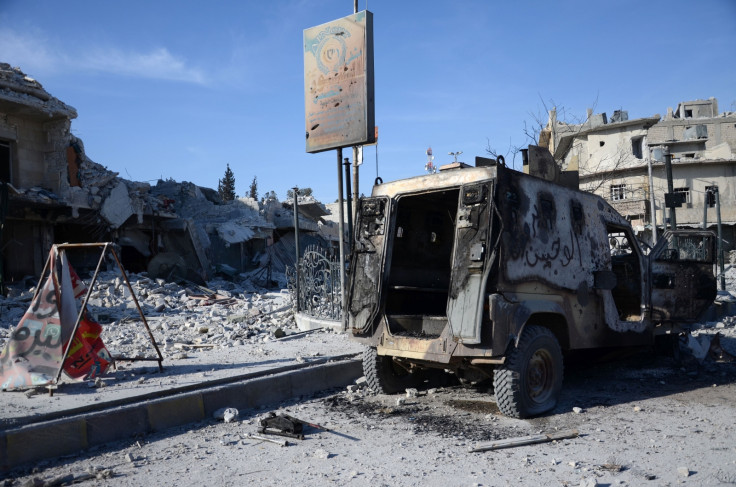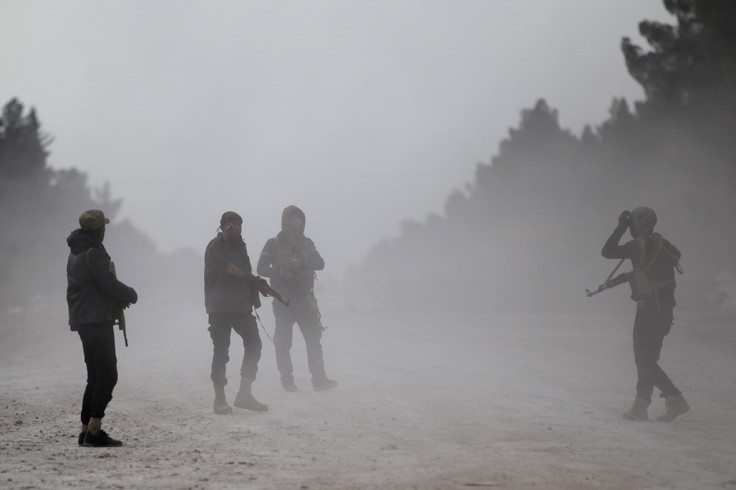Isis has been defeated in al-Bab - but US policy in Syria needs a new direction
America's support of demographically inappropriate allies has aided jihadi recruitment.

Turkey intervened in Syria in August 2016 with Operation Euphrates Shield (OES), which involved special forces, some regular troops, and the mobilisation of Syrian rebels to clear its border of terrorist threats by pushing Isis (the Islamic State) away from the frontier and preventing the Syrian branch of the Kurdistan Workers' Party (PKK) creating a state-let on its border that could be used as a harbour and launch-pad for attacks inside Turkey.
To secure this mission, on 13 November 2016 OES began an assault on al-Bab in the eastern countryside of Aleppo Province, just 15 miles from Turkey's border and Isis' last major urban centre in Syria outside its capital, Raqqa. Some 102 days of combat later, on 23 February, al-Bab fell. What happens next could determine the course of the war as Turkey competes with the PKK to be the US-led Coalition's partner in clearing Isis from Raqqa.
After the Syrian uprising broke out in March 2011, it remained peaceful for many months before taking up arms in response to the brutal crackdown by the regime of Bashar al-Assad, assisted from the earliest stages by Iran and its Lebanese proxy, Hezbollah. In tandem, the regime emptied the infamous Sednaya Prison of its jihadist inhabitants and filled the prison with peaceful activists, who were — and continue to be — subjected to crimes against humanity on a scale with few precedents since the Holocaust.
This was a wilful campaign by the regime and its allies to radicalise and militarise the uprising in the hopes of providing Assad with the sectarian, terrorist opposition he had claimed was the case all along.
The countryside of Aleppo Province began to revolt in early 2012. There were a series of bombings in Aleppo City of questionable origins, but the city itself largely stayed out of the rebellion until the summer of 2012. On 18 July, a mysterious blast killed several senior Assad regime officials and the next day rebels moved into the eastern part of Aleppo City.
Within three days both of Syria's major cities were ablaze. The rebellion held on in Aleppo City until December 2016, when it was defeated by the unmerciful cruelty of the regime and its allies, notably Russia, which employed both indiscriminate airstrikes and carefully targeted ones to systematically destroy the sinews of life like hospitals. Rebels and 30,000 civilians were deported from the humbled enclave to Idlib.
Al-Bab fell into rebel hands in late July and early August 2012 after intense fighting, just as the regime was escalating from the use of mass-artillery and helicopter gunships to fighter jets in its war with a rebellious population. The regime bombed infrastructure, bakeries being a particular favourite of Assad's air force, and al-Bab was a victim of that policy. Still there was space, and in the vacuum of authority al-Bab and nearby Minbij became centres of experimentation in revolutionary governance. Insurgent fractiousness has been a notorious problem and, though there would be other experiments in governance, they were Islamist character, in East Ghouta and later in Idlib.
With 20,000 people already dead in the summer of 2012 and Syrians asking the West for a no-fly zone to give them some respite from the air strikes as they plotted a country without the House of Assad at the helm, Michael Weiss, the co-author of ISIS: Inside the Army of Terror, went into al-Bab. "The makings of a civil society could already be glimpsed, especially at night," Weiss reported. "It was then that locals and rebels poured out into the streets, trading their cell phones and Kalashnikov rifles for garbage bags, white gloves, and brooms. Here were the Free Syrian Street Sweepers." Elections were being planned for a local council and attempts were being made to regulate civil-military relations.
This embryonic civil society would soon fall to another form of totalitarianism, however. After slamic State announced its presence in Syria in April 2013, it worked—as al-Qaeda's Syrian branch, Jabhat al-Nusra, now restructured as Hay'at Tahrir al-Sham (HTS), which broke away from Isis, still does —alongside the insurgency and sought to root itself in local populations, notably in the cities of al-Bab and nearby Azaz and Jarabulus.
Many were suspicious of Isis after the carnage it had inflicted on Iraq, but the fight against the regime took precedence; another front could not be afforded. Isis used this time to infiltrate communities, mapping the social terrain, co-opting who it could and assassinating those who it thought might stand in its way.
Islamic State's heavy-handedness and drive for monopolisation of power bred serious tensions with the rebels under the banner of the Free Syrian Army (FSA) by the summer of 2013. This exploded in January 2014 with a full-scale rebel offensive against Isis that swept it from positions in seven provinces, clearing Idlib and Latakia entirely and pushing Isis in a corner of eastern Aleppo. As Isis retrenched, the new front lines put al-Bab within the caliphate — and Minbij, too; the elected opposition council was liquidated.
This pocket of territory in the eastern countryside of Aleppo would serve as Isis' final gateway to the outside world and the entry-point for its foreign recruits until Turkey's intervention shut it down. In al-Bab, Isis' foreign intelligence branch, Amn al-Kharji, which has guided so many attacks within the West over thepast three years, would set up its headquarters. The operational head of Amn al-Kharji is Abdelilah Himich (Abu Sulayman al-Firansi), a French military veteran, and he answered to the caliph's deputy, Taha Falaha (Abu Muhammad al-Adnani), until Falaha was killed near al-Bab days after the Turks moved in.

Turkey now has a buffer zone and the rebels have a de facto safe zone, at the cost of Turkey having agreed with Russia to allow the pro-regime coalition to take over Aleppo City. Turkey had been preparing an intervention a year earlier but was dissuaded by US promises to restrain the PKK, even supporting the PKK-led Minbij offensive against Isis because of a US promise the PKK would withdraw afterwards. When the PKK violated this agreement and began moving north from Minbij toward Turkey's border it triggered the intervention. Turkey remains at loggerheads with its superpower ally and Nato partner over the PKK question.
The US is currently reassessing its options to defeat Isis in Raqqa. The new administration inherits a situation where the US overbalanced its support as between Arab rebel groups, which received minimal assistance, and the Syrian Democratic Forces (SDF), a PKK front-group with some dependent Arab units attached, that has been the US' preferred partner against Islamic State. The SDF is now positioned closest to Raqqa City. The PKK does not want to move into Raqqa City, but needs the political credit of doing so to secure its statelet in north-east Syria. The Turks, not unreasonably, see a PKK statelet as a threat and wish to deny this to the PKK.
Ankara has proposed that the US supports a Turkey-led operation that mobilizes Arab rebels to liberate Raqqa. Turkey's proposal to redirect policymakes a lot of sense in principle, not least because of the hostility of the local population to the PKK, partly born of the PKK's abusive treatment of Arab-majority areas it rules. The trade-off to liberating Raqqa in a sustainable way —displacing Isis with a capable governance structure that solves some of the issues of political legitimacy that gave rise to IS in the first place—would be a delay in the operation and a heavier US lift.
There are questions remaining over Turkey's capacity and various politico-military obstacles. Turkey had trouble raising vast numbers of Syrian forces in al-Bab. Extending to Raqqa from al-Bab seems unrealistic on logistical grounds alone and coming at Raqqa via Tel Abyad would be difficult because the PKK will not allow Turkish-backed forces passage through the territories they have seized for an assault on Raqqa. Still, with US involvement it is possible to envision solutions to these problems.
Aside from the danger that backing the PKK into Raqqa will at best reset the conditions for Isis and potentially ignite another sub-conflict in Syria from which Islamic State benefits, it is likely to cause further short-term conflict since Turkey is able to play spoiler to a PKK-led Raqqa operation. If the Turkish government's oft-threatened offensive against Minbij materialized, it would slow down the PKK-led Raqqa offensive by drawing away PKK troops, for example. Turkey might perhaps be deterred by the political storm this would cause with the Americans, or perhaps not since Turkish deference to U.S. policy enabled the PKK to grow this powerful.
US policy has spent six years adrift in Syria and narrowed the options to the point where a self-evidently contradictory policy—the US itself understood in Iraq that Kurdish and Shi'a militias shouldn't enter Mosul—is presented as the only option. The coalition's reliance on demographically inappropriate forces has already benefited IS in its ability to call on supporters around the world.
Nothing can be done about that now, but if further turmoil and a second revival of IS in its heartlands is to be avoided a new direction will be needed.
Kyle W. Orton is associate fellow at the Henry Jackson Society and a Middle East analyst and commentator. Follow him on Twitter: @KyleWOrton
© Copyright IBTimes 2025. All rights reserved.






















